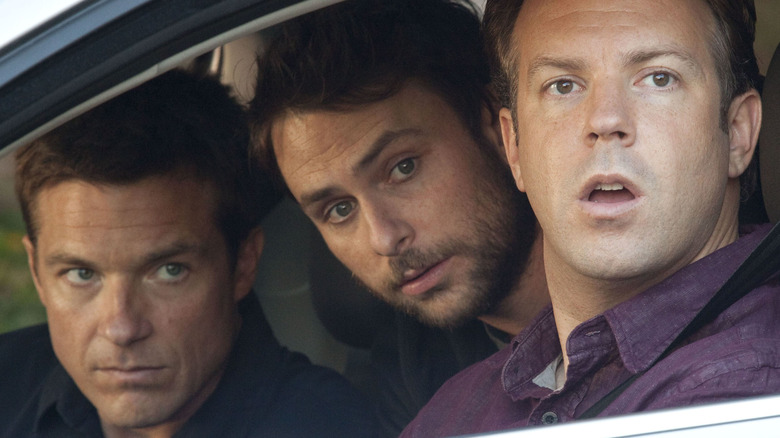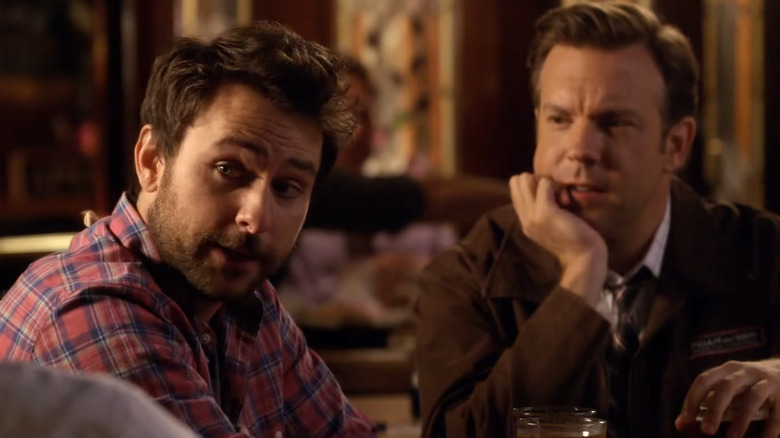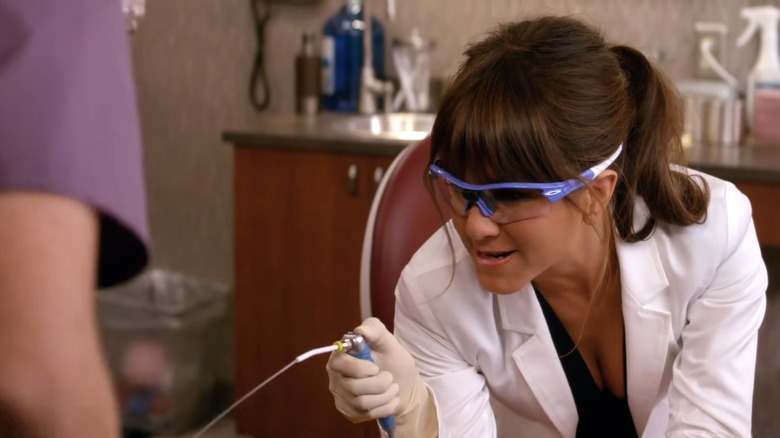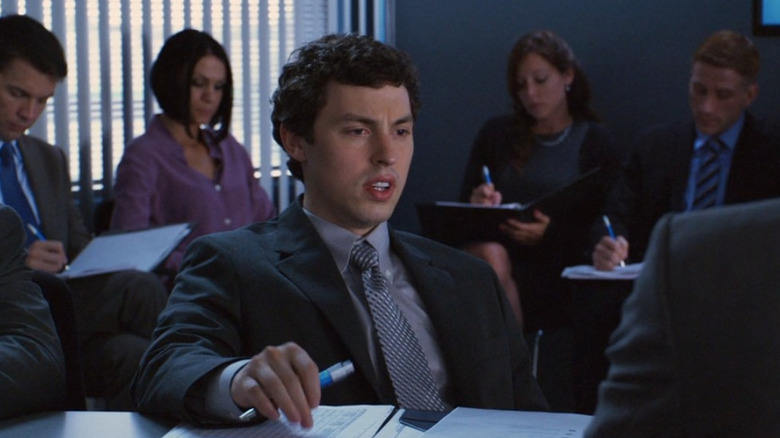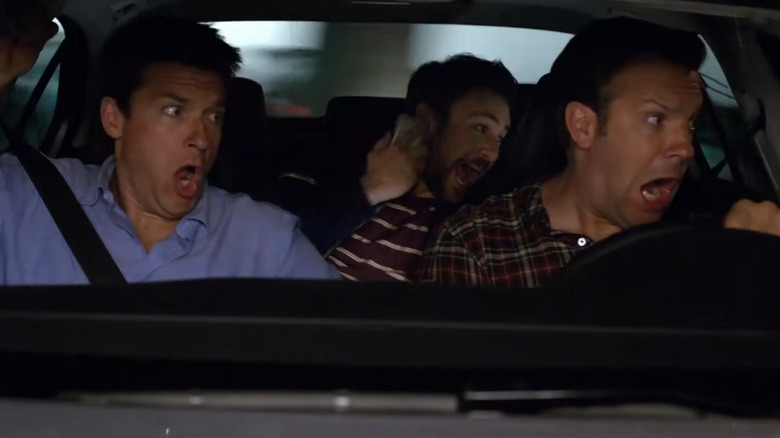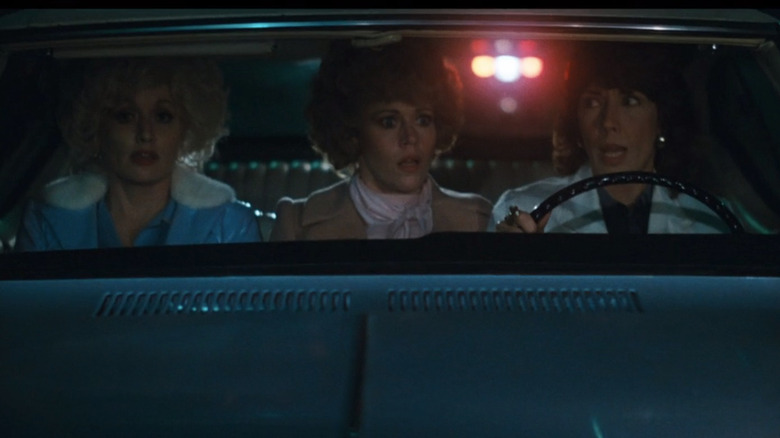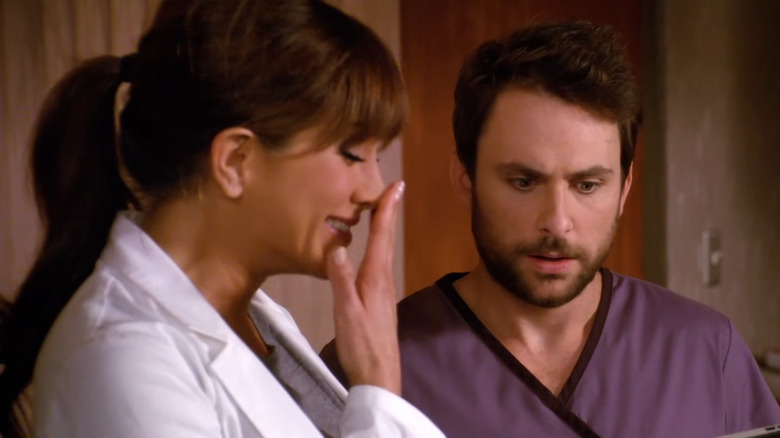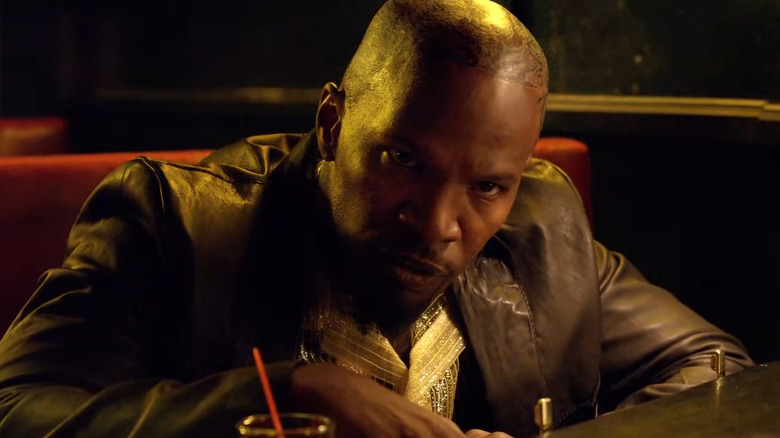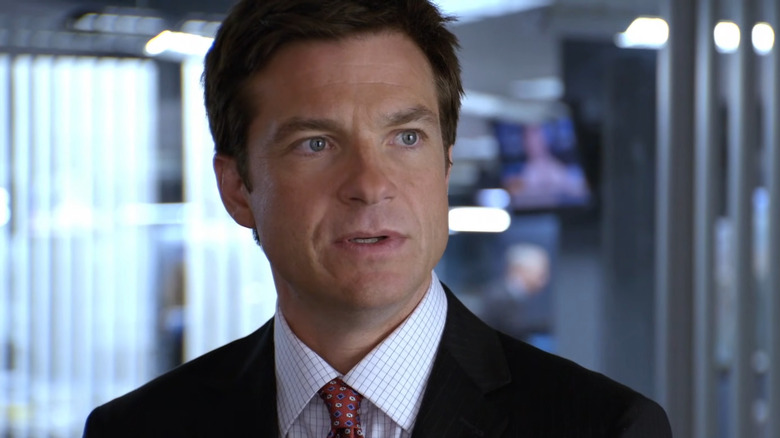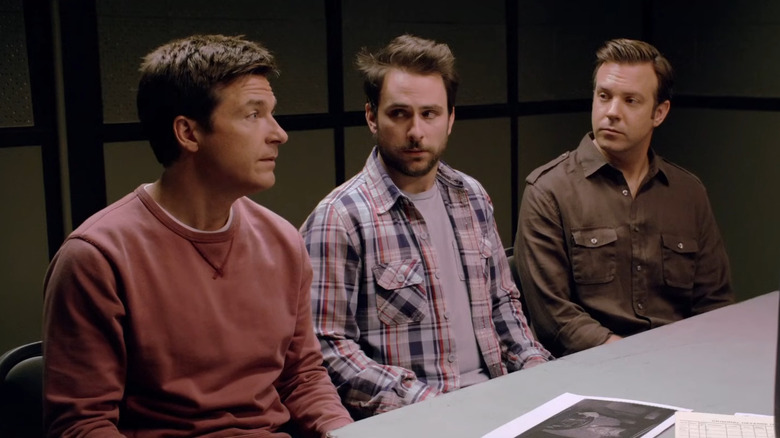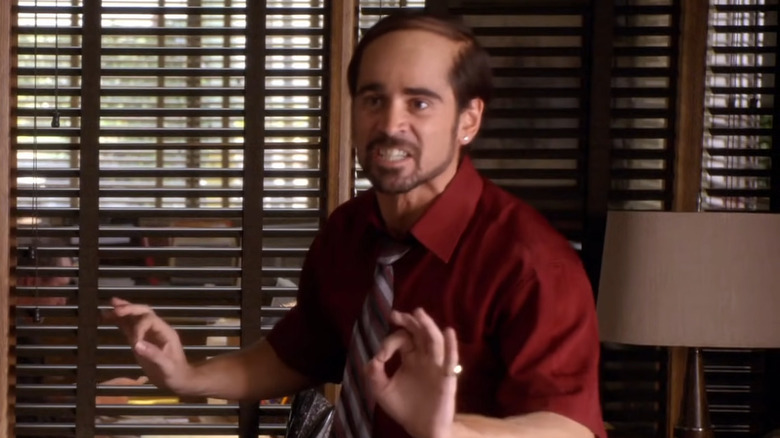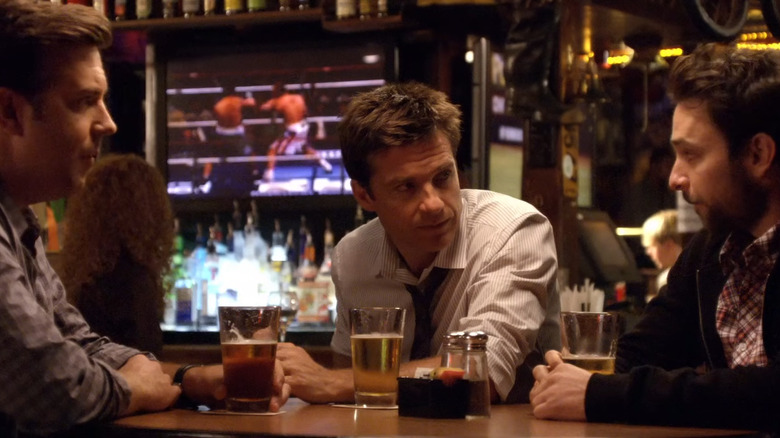Horrible Bosses Facts That Are Actually Not-So-Horrible
At some point in your career, you may have had a boss who got on your nerves, tested your patience, or maybe even made your entire job unbearable. "Horrible Bosses," the 2011 dark comedy starring Jason Bateman, Charlie Day, and Jason Sudeikis, takes this scenario to the extreme as three friends plot to do the unthinkable. Frustrated with their workplaces and jumping to a hyperbolic conclusion, they set out to kill their three horrible bosses.
In retrospect, the film showcases its three leads at unique stages of their careers. Bateman had long since wrapped the initial run of "Arrested Development," but hadn't yet begun its revival, and "Ozark" was still years away. Day was six seasons into "Always Sunny In Philadelphia," a series that would go on for at least ten more. Sudeikis was still a cast member on "Saturday Night Live," and the name "Ted Lasso" meant nothing to anyone.
This TV-savvy trio translated their comedic stylings to the big screen for a movie that plays out an insane hypothetical, resting on the audience believing these three people would actually go through with their outrageous plan. Though their bosses might be horrible, the making of the movie was anything but.
The stars found inspiration in their former day jobs
"Overnight success" is a term thrown around often in the entertainment industry, but while an actor or filmmaker might seem to have risen to meteoric fame after a breakout project, the reality is likely a much more gradual process that only appears instantaneous on the surface. In 2011, when "Horrible Bosses" first debuted, audience members would have already recognized most of the cast for their prominent television work, but they still might not have realized the actors had real jobs — not unlike their characters in the film — before breaking into showbiz.
In an interview to promote the movie, Empire Magazine asked Jason Bateman, Jason Sudeikis, and Charlie Day the last desk job each of them had. Bateman never had one, having begun acting as a child (Johnny Carson once introduced the youngster as "Joseph Bateman"). The other two, though, know what it's like to be in the doldrums. Sudeikis was an affiliate team manager for apartments.com.
Day, for his part, answered phones for the Motown digital anthology, one of many musical compilation tapes of years past. "There would be an infomercial on late at night and if someone in the midwest wanted to buy one of those," Day explained, "they would call a hotline and I was one of a room full of people answering phones. Poor guy invested his life savings in this business, and we sat around all through the night and the phones never rang."
You can't halfway be horrible
It's all in the name, but "Horrible Bosses" wouldn't connect with audiences without displaying, well, horrible bosses. While no rational human being would ever go to the lengths of actually trying to kill their bosses — and some of the zany antics displayed in the movie are knowingly far too outrageous for real life — the behavior displayed by the three leads' bosses had to be awful enough for the audience to understand what led these guys to such a disturbed train of thought.
That meant the actors playing the bosses had to commit to being characters the audience could hate, just as the main characters did. Jennifer Aniston plays Dr. Julia Harris, a dentist supervising Charlie Day's character, Dale. Aniston felt that the best approach to portraying a mean boss was to go at it full force, leaning into the absurdity of her character.
"With a comedy like this ... you can't halfway be horrible," Aniston explained an interview with Bonnie Laufer. "You've got to really be horrible. You have to commit to the devious of it all, and that's what we did and it was great."
And commit Aniston did. Poor Dale constantly fears what new, psychotic ways Dr. Harris will attempt to seduce him with, whether it be inappropriately handling dental patients under anesthesia or squirting the water mechanism directly at Dale's pants.
Wait, is that...?
Sometimes you can't place where you've seen an actor before, and it drives you crazy. In the case of "Horrible Bosses," one character who mostly stays in the background might look familiar, just vaguely enough so that you might even brush it off as being in your imagination that you've seen him before. Fans of "Freaks and Geeks," the ill-fated 1999 teen drama turned cult classic, aren't imagining things — yes, that's really the guy who played Sam Weir, all grown up, playing Jason Bateman's co-worker.
His name is John Francis Daley, and he had much more than a small on-camera role in "Horrible Bosses." In the years following "Freaks and Geeks," his stint on "Bones," and a string of other projects, Daley tried his hand on the other side of the camera, sharing with Collider that writing was always a passion he was excited to try out in the film industry. With his writing partner Jonathan Goldstein, Daley took a pass at a revision of the "Horrible Bosses" script after Michael Markowitz wrote a first draft.
Since "Horrible Bosses," Daley and Goldstein have reunited with the film's stars for additional projects. The pair directed the 2015 reboot of "Vacation," which Charlie Day appeared in, as well as 2018's "Game Night," which starred Jason Bateman. Daley and Goldstein are gearing up to unveil "Dungeons & Dragons: Honor Among Thieves," which they directed and co-wrote.
The car chase wasn't green-screen
Toward the end of "Horrible Bosses," the plan of the three leads goes sideways and they wind up in an intense car chase through the night, in hot pursuit by one of their bosses who they just saw commit murder. Director Seth Gordon knew he'd get the best performances out of the actors if the car chase was as authentic as possible. He didn't want to resort to an artificial method, like a green screen. However, even given the amount of talent Jason Bateman, Charlie Day, and Jason Sudeikis possess, they're not professional stunt drivers. Gordon knew he couldn't exactly have the actors screeching through real streets. The solution met halfway.
Speaking to Empire Magazine, Gordon talked about how the cast and crew pulled off the stunt. "It was really important to me when we shot that car case sequence that our guys be put in the real environment as much as possible," Gordon said. "We actually created this special rig where there was a stunt driver mounted to the roof of our guys' car. When he turned his wheel, our guys' wheel would turn too, and we would frame him out. I wanted the physics and all the action to be as real as possible." So when you see Bateman, Day, and Sudeikis screaming for dear life as their car zips and zooms every which way, there might be some amount of reality in their fear-stricken faces.
A handful of classic comedies inspired the writers
If "Horrible Bosses" might feel reminiscent of a few other movies you've seen before, that might be by design. In an interview, director Seth Gordon, writer Michael Markowitz, writer John Francis Daley, and producer Jay Stern shared some of the films that inspired them while developing "Horrible Bosses."
For starters, the story borrowed a key aspect of 1951's "Strangers on a Train," in which two people agree to murder someone the other person wants killed. In terms of comedy style, the crew leaned into the techniques of 1959's "Some Like It Hot" and 1963's "It's a Mad, Mad, Mad, Mad World." The camaraderie among three friends facing off against their tyrannical workplaces found inspiration from 1980's "Nine To Five." Meanwhile, the title "Horrible Bosses" itself was a nod to 1986's "Ruthless People."
Gordon explained the crew's vision for pooling together thematic ties from all of those movies to create something new. "I think the best comedies always have really high stakes and full commitment to the characters and the story," Gordon said. "And it never undercuts itself; there's never any attempt to excuse itself for what it's doing. In our case, I think we really went for it. There was never a question of, 'Oh, should we? Could we?' Every day we just went for it and I think it shows."
Charlie Day and Jennifer Aniston handled their awkward moments professionally
While the characters played by Bateman and Sudeikis each experience their fair share of a hostile work environment, Charlie Day's character, Dale, endures nothing short of sexual harassment.
Jennifer Aniston plays Day's boss at a dentist office and constantly attempts to sexually harass him at work. The actors held nothing back while filming, with one particularly R-rated scene showing Dr. Harris abusing dental medicine to take explicit photos with Dale's unconscious body. As you might imagine, shooting such scenes occasionally led to awkward moments when the cameras cut.
Aniston told interviewer Bonnie Laufer, "I just felt like I was apologizing to him all the time." Aniston thought the script was hilarious upon reading it when she was up for the part. Later reality set in. Speaking with Backstage Magazine, she said, "The truth is when you get there, you go, 'Oh, God, now I have to do this, like, in front of people.'"
Committed to their roles, both Aniston and Day share a number of moments in the film that are comedic for the purposes of the movie, but would be highly unethical in real life, hence Dale's central plight in the story. In reflecting on the movie in 2020 with Access Hollywood, Day said with a laugh, "It was humiliating for me!" However, he continued, "Jen was super professional and made me feel very comfortable. Honestly, we had a lot of laughs. That was such a great experience."
Jamie Foxx let it ride
In "Horrible Bosses," Jamie Foxx plays Dean MF Jones, who the characters played by Bateman, Day, and Sudeikis hire as a murder consultant. At first, the trio think they're enlisting the services of Jones to actually commit the intended murders of their bosses, but Jones later makes it clear that all he's offering is advice. They'll have to do the deeds themselves.
In playing MF Jones, Foxx leaned in to the rule-breaking of typical filmmaking formulas that comedy allows. Speaking with ScreenSlam on the red carpet at the "Horrible Bosses" premiere, Foxx explained that with most films, "there's a certain lane that you stay in, and that's the lane you're gonna be in for the rest of the movie." However, he continued, "with comedy, you just let it ride. That's what I'm from." Foxx also shared who inspires him as a comedian. "I look at Eddie Murphy all the time, so envious, like, 'Man, we'll never catch him.'"
The writers developed the script with Jason Bateman and Jennifer Aniston in mind
While an actor might on occasion be attached to a project from its early development stage, typically the script comes before the casting process. Nevertheless, sometimes a scriptwriter might picture a certain actor when writing a screenplay. That doesn't always mean that same actor gets cast in the role, but it can help inform the personality of the character and give the casting director an idea of what style of performance to look for in selecting an actor.
Luckily for "Horrible Bosses," the writers only ever had Jason Bateman and Jennifer Aniston in mind for their roles, writing the characters for their talents specifically. In an interview with members of the cast and crew, writer Michael Markowitz shared that tidbit with the actors for the first time.
Laughing, Markowitz remarked, "I never knew whether it would be rude to tell you that I thought of you for that part." Aniston replied, "Are you kidding? It's a compliment." Markowitz elaborated on what drove him to envision Aniston for the role specifically. "I broke my leg and I was watching DVDs. I watched 'Friends' start to finish and said, 'Oh, well, she'd be great in this.' So I always knew Ms. Aniston could do it."
The director approached the soundtrack from a unique angle
Tired of traditional comedy scores, director Seth Gordon wanted the music of "Horrible Bosses" to be inspired by the Black Keys and the Beastie Boys, as he explained in a 2011 interview. Before Gordon hired a composer or anyone wrote the actual music that would be used in the final cut, the film's editors included music from those bands as temporary tracks within the in-progress version of the movie.
The Beastie Boys eventually gave permission for the film to use their song "Sabotage" in the movie, which Gordon noted is a rarity for them. In a fitting touch of authenticity, the movie's score was ultimately composed by Christopher Lennertz, who leads a band featuring Money Mark, a musician who played on many of the Beastie Boys' albums.
Not only did the music of "Horrible Bosses" have a different sound from other projects in its genre, but its process was also unique. "We recorded the score for the movie like you would record an album that you sell as a CD or something," Gordon said. "And that's a totally different mindset from a traditional music score for a movie. It has happened in the past, but not quite like this, and not quite with this group of musicians, so it was awesome."
Colin Farrell had free range for his narcissistic character
In "Horrible Bosses," Colin Farrell plays Bobby Pellit, boss of Jason Sudeikis. Pellit is a lazy jerk who inherits a company from his deceased father and has no intention of running the business with any semblance of fairness, logic, or productivity. A frequent drug-user, Pellit's workplace behavior is typically dazed and belligerent, bullying employees and generally not caring about the consequences of his actions or upholding his father's legacy.
In publicity materials for the movie posted by Fandom Entertainment, Farrell spoke of the creative license he had in portraying Pellit. "He just really thinks he's God's gift to everything that's imaginable," Farrell said of Pellit, "and he's really not. He's really sad and kind of pathetic and tragic and lonely and miserable, but he has no idea, even himself, that he is. With all that obvious 101 psychology going on, it was a plethora of stuff to play with and it didn't feel like there was any way to do it wrong. It just felt like we could do variations on the one theme that Seth [Gordon, the director] seemed to understand ... complete free range to go all over the place."
If you or anyone you know needs help with addiction issues, help is available. Visit the Substance Abuse and Mental Health Services Administration website or contact SAMHSA's National Helpline at 1-800-662-HELP (4357).
The actors frequently improvised
When a production involves experienced comedians like Bateman, Day, and Sudeikis — who are funny in their own right even before given a script to recite — one might wonder if there was any freedom involved for the actors to improvise new material within a scene or tweak verbiage here or there. Some movies and television shows are strict about keeping to the script, while others are loose. "Horrible Bosses" fell into the latter category.
Day said in a 2014 interview that director Seth Gordon encouraged the actors to take creative liberties with their performances. "He shot it in a way that we could really talk over each other, like we do in real life," Day said, "and it makes it seem more conversational."
Naturally, changes made in the moment to what was probably a painstaking scriptwriting process prompted a startling reaction from the writers. John Francis Daley, one of the writers of the film, told Collider, "it was admittedly a bit scary, at first, to see how much they strayed from the page, in certain places." However, Daley noted that Gordon "was very tactful with which takes worked and which ad-libs worked. It's always better to have more to work with than less, and I think that all of the ad-libbing that they did really produced some incredibly funny moments that we didn't even think about when we were writing."
